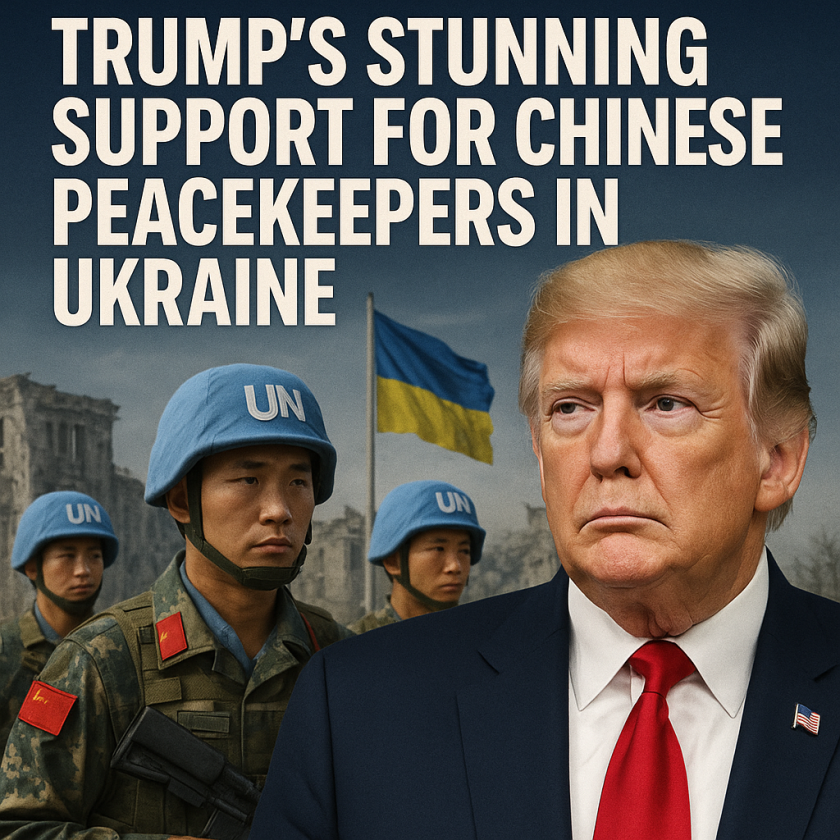Trump’s Stunning Support for Chinese Peacekeepers in Ukraine
Trump’s Stunning Support for Chinese Peacekeepers in Ukraine
In a surprising twist during a recent speech, former President Donald Trump expressed support for the deployment of Chinese peacekeepers in Ukraine, igniting a whirlwind of discussions around the geopolitical implications of such an endorsement. This unexpected stance raises questions not only about international relations but also about America’s role in global peacekeeping and the wider impact on the ongoing conflict in Ukraine.
The Context of Trump’s Support

Trump’s remarks came amid escalating tensions in Ukraine and ongoing diplomatic dialogues regarding peace efforts. Historically, the U.S. has held a critical view of Chinese influence in global conflicts, especially given the strategic partnerships between China and Russia. However, during the discourse, Trump suggested that introducing Chinese peacekeepers could create a “neutral ground,” fostering an environment conducive to peace talks.
Different perspectives have emerged in response to Trump’s comments. According to an analysis from RT, Trump’s idea may stem from a belief that engaging with China in conflict resolution could reduce U.S. involvement in overseas conflicts and might shift the burden onto global competitors. The piece highlights the potential for a shift in diplomatic paradigms, questioning whether U.S. allies would support this unexpected alliance with a nation that many see as a strategic adversary.
Conversely, analysts from Al Jazeera raised concerns regarding the feasibility of involving China in peacekeeping efforts. The sentiment is clear: many believe that China’s involvement could complicate peace negotiations. Given China’s strong ties with Russia, there’s skepticism about whether their peacekeeping forces would be perceived as neutral, or if they might deepen existing divides.
Diverse Reactions from Global Leaders
Reactions to Trump’s proposal varied widely among global leaders and analysts alike. Some welcomed the notion, arguing that new perspectives are needed to break the deadlock in the Ukraine crisis. For instance, certain European officials hinted at the potential for a multi-nation peacekeeping force that could include other nations in addition to China, suggesting an inclusive approach to peace.
On the other end of the spectrum, a significant number of U.S. lawmakers expressed alarm over Trump’s take. Reactions from Republican Senate members highlighted a deep-seated belief that any cooperation with China on the Ukrainian front could be detrimental. Senator Lindsey Graham commented that such a move could “undermine U.S. influence” and shift the balance toward Russian interests, signaling a concern that China’s involvement might not lead to a resolution but rather exacerbate tensions.
Understanding the Implications of Peacekeeping
The idea of involving Chinese peacekeepers prompts discussion about the role of international actors in global conflicts—especially in sensitive geopolitical landscapes like Ukraine. Peacekeeping operations are traditionally led by organizations like the United Nations, and questions arise about the legitimacy and effectiveness of peacekeepers coming from nations with vested interests in the conflict.
In previous peacekeeping missions, successfully establishing trust between conflicting parties has been a critical requirement. If China were to lead such an effort, its historical position with Russia could raise apprehensions regarding the impartiality of such operations. Furthermore, a report by Sky News pointed out that international law and norms surrounding peacekeeping could be strained by unconventional partnerships, potentially setting dangerous precedents.
Toward a Nuanced Understanding of Global Politics
While Trump’s endorsement of Chinese peacekeepers in Ukraine may initially seem imprudent, it highlights the nuanced complexities within international relations today. His comments may underscore a growing recognition that traditional geopolitical divisions can produce stagnation rather than solutions.
Engagement with China in peacekeeping might serve as a stepping stone towards more collaborative interstate relations, potentially reshaping future diplomatic frameworks. However, it is crucial to recognize the uncertainties that come with it. Would peace truly be attained? Or would such an intervention lead to a deeper entrenchment of conflicting interests?
In weighing various perspectives, it becomes evident that while innovative ideas are necessary for peace in Ukraine, the implications of involving China remain profoundly complex and controversial. An open-minded approach is essential in discerning the potential benefits or pitfalls that may arise from such partnerships.
Conclusion: A Call for Dialogue
As the world watches closely, Trump’s unusual stance offers an opportunity for dialogue about the roles of major global players in peace processes. The complexities of the Ukraine situation call for innovative solutions, yet the path forward must be navigated carefully, taking into consideration both historical relationships and contemporary geopolitical realities.
While consensus is elusive, encouraging conversations that embrace multiple viewpoints may pave the way for genuine solutions, ensuring that the quest for peace remains united in purpose while respecting the multifaceted nature of global diplomacy.






































